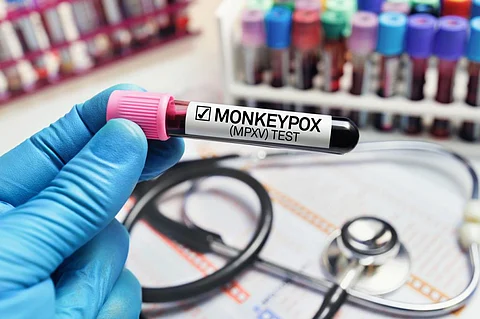

As many as 85,765 confirmed and 1,382 probable cases of mpox (monkeypox) were reported from 110 countries since January 1, 2022, according to a statement by the World Health Organization (WHO) on February 12, 2023.
The number of deaths from the viral infection was 93 as of February 9, 2023, the United Nations health agency noted.
The United States was the most affected, recording 29,948 confirmed cases during the period, WHO shared. It was followed by Brazil (10,758), Spain (7,533), France (4,128), Colombia (4,074), Mexico (3,828), Peru (3,737), the United Kingdom (3,735), Germany (3,692) and Canada (1,460), the statement mentioned.
Monkeypox is a zoonotic viral disease with symptoms similar to smallpox, but is less contagious. It was first diagnosed in humans in 1970 in the Democratic Republic of Congo in Africa. It currently has a case fatality ratio of 3-6 per cent.
It spreads from one individual to the other by close contact with lesions, body fluids, respiratory droplets of infected individuals as well as contaminated materials such as bedding, according to WHO. “Monkeypox typically presents clinically with fever, rash and swollen lymph nodes and may lead to a range of medical complications.”
Vaccines used to eradicate smallpox provides protection against mpox, since the disease is caused by a virus similar to and from the same family as the smallpox virus. New vaccines against the disease have also been developed and approved. “An antiviral agent developed for the treatment of smallpox has also been licensed for the treatment of monkeypox,” according to WHO.
“The ongoing outbreak of mpox continues to primarily affect men who have sex with men. At present there is no signal suggesting sustained transmission beyond these networks,” the statement by WHO mentioned. Exceptions to this trend were observed in West and Central Africa, it added.
From January 30-February 5, 2023, the new cases globally dropped by 60.5 per cent compared to the preceding week, according to WHO.
In the last four weeks, 82.7 per cent of mpox cases were reported in the Region of the Americas.
“In the past 7 days, 13 countries reported an increase in the weekly number of cases, with the highest increase reported in Chile. 75 countries have reported no new cases in the past 21 days,” the global health body added.
This global outbreak is the first instance of mpox cases being reported in countries without direct or immediate epidemiological links to areas of West or Central Africa, where the disease is endemic, WHO highlighted. “Since 13 May 2022, a high proportion of these cases have been reported from countries without previously documented mpox transmission.”
Following consultations with the International Health Regulations Emergency Committee last year, the WHO Director-General Tedros Adhanom Ghebreyesus in October 2022 determined that this outbreak “continues to constitute a public health emergency of international concern and issued revised temporary recommendations in relation to the outbreak”.
WHO assessed the global risk as ‘Moderate’, according to the latest statement. “Regionally, WHO assesses the risk in the Region of the Americas as ‘High’ and as ‘Moderate’ in the African Region, Eastern Mediterranean Region, European Region and the South-East Asia Region. The risk in the Western Pacific Region is assessed as ‘Low’.”
WHO also announced that it will prefer to call the disease ‘mpox’ and phase out the name ‘monkeypox’ to “minimise unnecessary negative impact of names on trade, travel, tourism or animal welfare, and avoid causing offence to any cultural, social, national, regional, professional or ethnic groups”.